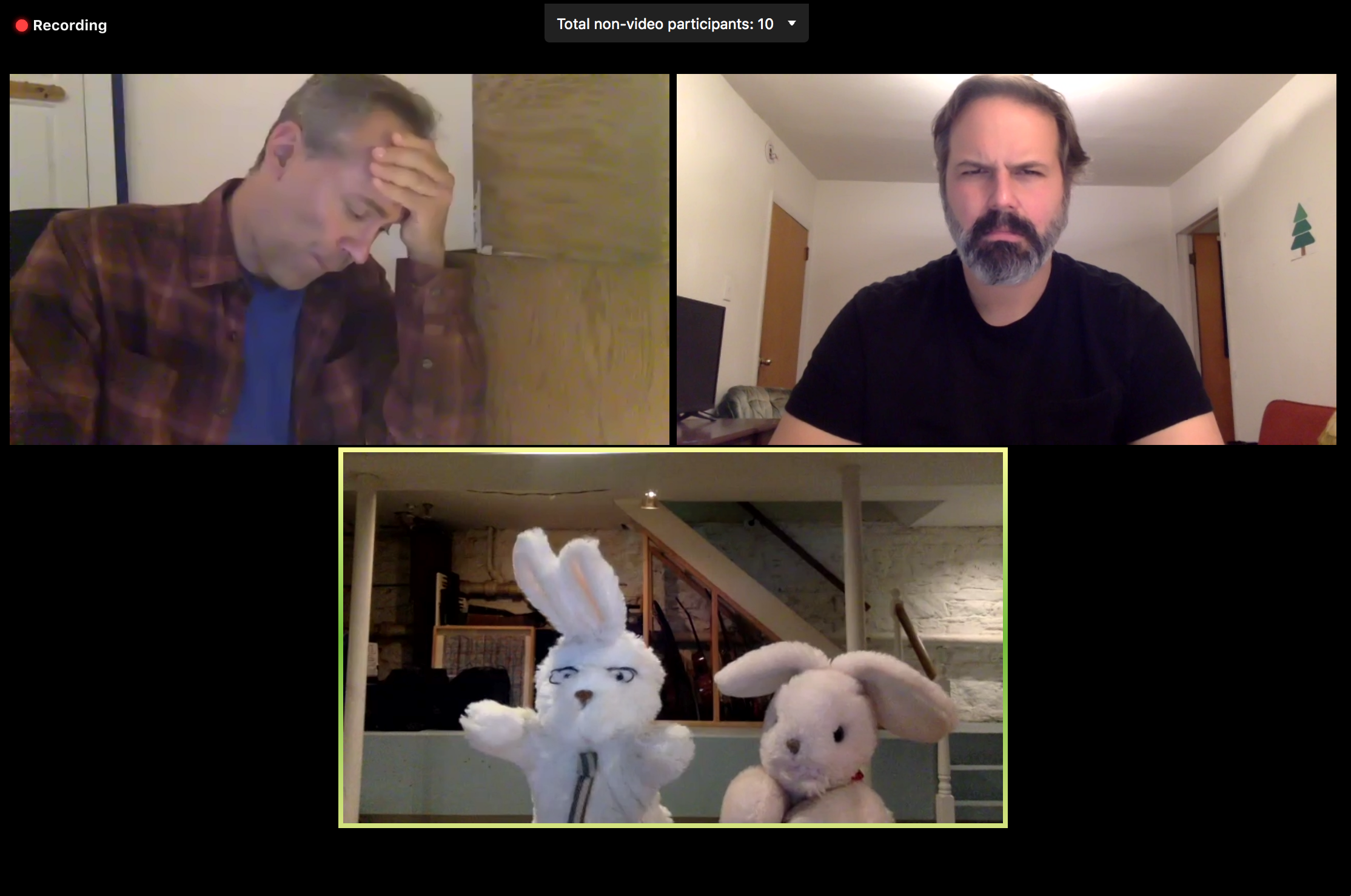Review: “Zero Cost House” With Pig Iron Theatre Company
Featured: Dito van Reigersberg, Alex Torra, Saori Tsukada (Rabbit Couple). Screenshot by Pig Iron Theatre Company
“Zero Cost House” tells the story of playwright Toshiki Okada’s journey to understand both himself as an artist and person and as well as the ever-changing world around him. Originally written during the earthquake, tsunami, and Fukushima nuclear disaster in Japan, we see every thought and struggle both external and internal as this artist tries to find his place in it all. This play began on stage with Pig Iron Theatre Company but has since made the switch to Zoom. The company says they like the Zoom version more than the original staged version and I can see why. Through this online platform, the company is able to truly create something that is unique in its theatricality.
With all of these Zoom productions happening it’s always exciting to see how theatre artists will get creative with the platform’s limitations and perhaps make something completely new. “Zero Cost House” did this in a very fascinating way. In most Zoom productions, you are meant to focus on what is going on within each box rather than the box itself. However, “Zero Cost House” utilized the naming feature on Zoom in such a way that each of the actors could switch from character to character not with a big scene change or costume change, but simply with a name change. One actor starts as Okada talking to his artistic inspiration, Henry David Thoreau and in another scene, the actors have switched roles. One might think that this would cause things to be confusing or distracting but the ensemble is so in sync that the characters feel as consistent as if they were played by the same person. This can even happen within a scene where we see actors going from Okada to Okada’s manager seamlessly and almost unnoticed until something about the different mannerisms make you check the little name box. It’s an incredibly unique and exciting use of Zoom that helped this play stand out among a sea of digital productions.
Another great use of the platform was in the moments where everyday objects were utilized for beautiful effects. A fidget spinner and a light become a whirring blur of colored lights, a close up of a slinky becomes dizzying, and several pieces of mini furniture floating in water becomes a powerful image in a play about a natural disaster. These effects were given their own Zoom square and performed by masterfully by Maiko Matsushima.
There were many things that fascinated me about the constant switching of the main character from actor to actor, but the most striking was how in most autobiographical stories we are given one person’s story. One person’s journey. We follow that person to the end and hope they come out the other side different. With this play, however, passing the subject of the story from actor to actor brought attention to the universality the artistic struggles presented. It still told a deeply personal story, of course, but by allowing other actors to take on the struggles, it almost allowed us, the audience, to take them on as well. Things like Okada’s past self worrying about how his future self might not like the work of his artistic inspiration as much or looking back on a different chapter of your artistic life and trying to understand it and perhaps longing to return to it, are all things that artists go through every day, now more than ever. The switching of characters really helped connect with that.
The play has a sort of existential charm with characters like the rabbit puppets and Henry David Thoreau appearing throughout to tell parts of the story. Dito van Reigersberg and Alex Torra as both Present Okada and Thoreau play both parts with incredible honesty. The two work off each other so well that when their parts eventually switch, it’s seamless and you forget that they weren’t playing that part only moments earlier. Aigner Mizzelle as Past Okada played the part with the beautiful hopefulness of a young artist and was a joy to watch as well. Will Brill as Kyohei Sakaguchi brought an energy unlike anything in the rest of the show and each time he came on-screen to deliver one of his monologues I found myself leaning closer to the screen. I also enjoyed Okada’s choice to tell these parts of the story from Sakaguchi’s perspective. It added even more layers to a memoir that already had many layers.
With great performances, a beautiful script, and a fantastic use of the digital platform, “No Cost House” was certainly worth hopping on Zoom for.
Zero Cost House (for Zoom)
Text by Toshiki Okada
Translated by Aya Ogawa
Adapted by Dan Rothenberg and Pig Iron
Directed by Dan Rothberg
Featuring: Will Brill, Maiko Matsushima, Mary McCool, Aigner Mizzelle, Alex Torra, Saori Tsukada, and Dito van Reigersberg
With Design Consultants
Visual: Maiko Matsushima
Sound: Rucyl Frison
Stage Managed by Adam Swez
With Sound Operator: Jacob Gilbert
And dramaturgy by : Alexandra Tatarsky
For more information go to: https://pigiron.org/productions/zero-cost-house-zoom
